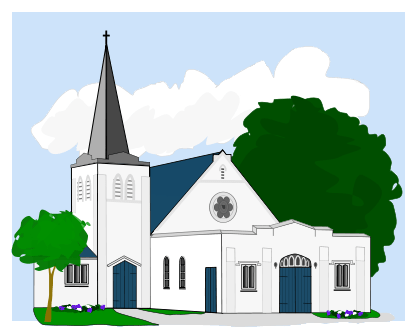While about 96% of pastors use computers at church and many use technologies during their sermons, not that many actually have a church website. This can prove problematic since millions of church-goers and prospective church-goers search the Internet and their own place of worship’s website each day (Capterra).
If you have not already started building a website for your church, here is why you will want to consider building one.
1. A Website Keeps Your Congregation Engaged and Active
According to research, over 80% of church-goers say that a church’s website is important in facilitating their participation at church . A website allows them to explore serving opportunities at church, connect with their congregation and community, forward helpful information to others, and more.
If you include valuable information such as community bulletins, event calendars, volunteer sign-up forms, blog posts, podcasts, recorded sermons, social media links, etc. on your church’s website, you provide great opportunities for members of your congregation to stay well-informed and active in what is happening at your church, as well as events and programs your church is sponsoring or organizing.
2. A Website Allocates a Central Location to Share Up-to-Date Events Calendars, Service Programs, and Bulletins
Instead of spending tons of money printing out calendars, information about programs, and bulletins, and then mailing them each month or every few weeks, you can simply upload them and share them on your website. Doing this is also better for the environment.
In addition to saving money and decreasing your paper trail, you will be able to easily update calendar and program information last-minute on your website in case anything changes. People will also be able to sign up for events and programs online at their own convenience, which will be much easier to organize and track.
3. A Website Introduces the Public to Your Leadership and Programs
On your church’s website, you can create a page that includes bios of your pastors and co-pastors, youth pastors, staff, etc. This way, the public will know their backgrounds and what they are passionate about before stepping foot in your church. They will also have access to detailed information about what types of services and programs you offer.
Having such information available online will make prospective congregation members feel much more comfortable visiting your church in person, as they will already have insight into what type of ministry they will experience and who will be leading.
4. A Website Can Welcome Outsiders to Your Congregation and Ministry
You can use your church website as a space to extend an open invitation to prospective members and those who are seeking spiritual guidance. Consider designing a home page that is positive and extends open arms and portrays a message of community and hope.
A lot of prospective worshipers may be timid or unsure about attending church simply because they have not been to one before and are afraid of being rejected or being perceived as an outcast. Use your website to put them at ease and express your desire to have them visit your establishment.
5. A Church Website Is Easily Promoted Through Location-Based SEO
Did you know that it is easy to promote your church website online and across search engines through location-based SEO (Search Engine Optimization)? And that including location-based SEO on your website will help more people in your neighborhood or local community find your church online? It is easy to do and does not require much work to get your church website found online. Start by adding your church address, contact, and location information on your website
6. A Website Showcases Your Church’s Community Involvement
Use your church website to display the reach and extent of your ministry and inspire others to get involved too, even if they are not current members of your congregation. Showcase programs your church oversees or supports within your community, such as afterschool programs, programs that feed the homeless, etc. You will especially want to highlight other non-profits and community organizations your church works with often, as well as special holiday events and programs you host each year. You will want to showcase that your ministry and community reach goes beyond services hosted on Sundays.
7. A Website Can Extend a Secure Way to Receive Digital Donations and Contributions
69% of all church giving transactions are completed with a card nowadays and 70% of church-goers are willing to donate their tithings digitally. With a church website, you can allow others to donate when it is convenient for them online. You can include a secure portal that collects payments digitally on your website.
8. A Website Can Increase Involvement in Bible Study, Reading, and Prayer Groups
When more church members know when a Bible study is being held, they are more likely to sign up for it and show up for it. And, if your congregation can access a member directory via your website, you will likely see more active prayer groups and more support from the overall congregation.
Additionally, you can share handouts and information from different groups on your website, so that others can access it and become involved. Overall, with an online presence, you will see more engagement from your groups and be able to build an active platform where your community members can really get involved and support one another.
9. A Website Offers a Cost-Effective Platform to Reach Out to Prospective Members
Along with implementing low-cost location-based SEO tactics (mentioned above), you can also share links to your church’s website in emails and across social media outlets to reach prospective members. You can easily share blog posts and emails about new and popular programs, as well as include information about where interested parties can go on your website to sign up or learn more about your church and its programs.
Your website can serve as the central information hub for everything prospective members will need to know when considering your church.
10. A Website Provides Links to Social Media Outlets, Podcasts, Recordings, and Blog Posts—Spiritual Content People are Searching for Already
According to research, people are beginning to search for online church options in staggering numbers. Millions of people want to listen to sermons via podcast or through video. And, millions of people read blog posts too. In addition, about a quarter of the world’s population has access and regularly uses social media.
You can include the type of content that people are searching for already on your church website. Consider hosting a weekly podcast, recording some of your sermons, or regularly sharing blog posts, or even short inspirational thoughts on your website—it is a great way to build your online and in-person congregation, while spreading your ministry.
After considering all the benefits that building a website can bring to your congregation, church, and community listed above, you will not want to delay building the ideal website any longer.




